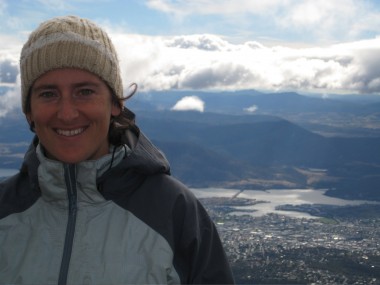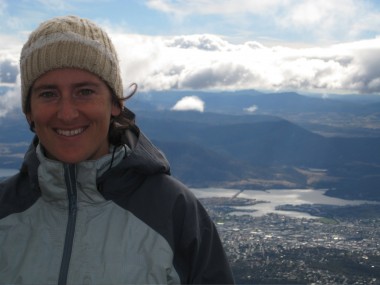“I feel like my life has been blessed because I’ve almost never encountered any situation in which I’ve had limited options because of my gender.” Dr Tamara Davis.
Can you imagine being forced to lie about your marriage and living with the threat of being sacked if your bosses found out? Well that’s what life was like for women working in Australia’s Public Service until the amendment of the Public Service Act in 1966.
Married women either accepted temporary positions with poor career prospects and no entitlements, or they lied – even if they were super smart, bright lights like Ruby Payne-Scott.
Ruby Scott was a pioneer radio physicist, mother, teacher and spoke up for what she believed in. World War two offered her a lucky break, the manpower shortage meant she was put on the payroll at the Radiophysics Lab of the then Council for Scientific and Industrial Research at Sydney Uni, where she had studied.
Her work, classified ‘top-secret’ was instrumental in forcing the Japanese out of the Pacific. Ruby and her colleagues had fashioned radars out of “coathangers and sticky tape” to protect the coastline.
She also developed a means of measuring radio emissions from the Sun and stars, a breakthrough which would in turn lead to the construction of sophisticated radio telescopes. The groundbreaking work was called: ‘radio astronomy’. (source: www.naa.gov.au/)
When her six-year secret marriage was finally exposed in 1950, Ruby didn’t go down without a fight, telling the CSIRO:
Personally I feel no legal or moral obligation to have taken any other action than I have in making my marriage known… the present procedure with regard to married women… seems to go far beyond the simple statement in the Act … [it] is ridiculous and can lead to ridiculous results.
Miss Payne-Scott is no longer with us, so I asked a modern-day astrophysicist Dr Tamara Davis (one of the most cited astrophysicists in the world) to put this legacy into context.
MH: Dr Davis, what has the work of Ruby Payne-Scott and her contemporaries meant for your own career?
Dr D: Thanks to the trail-blazing efforts of Ruby and her contemporaries, I’ve never felt anything but warmly welcome in my choice of physics and astrophysics as a career. There was never any question about whether it was appropriate for me to take physics, and I have always been strongly supported by all my colleagues, male and female. No doubt there are still subtle biases in the system, and women are still out-numbered by men in my field about 5-1, but I find it a fantastic and enjoyable field to work in, and one in which I feel very well-respected, irrespective of my gender. So I have very much to thank them for.
MH: In the 1940’s when she received her ‘lucky break’, there were few opportunities for women. Can you shed some light on how frustrating that must have been to a woman who obviously loved the field she was in?
Dr D: I find it incredibly difficult to imagine being put in that situation. It’s hard to believe that just a few short generations ago attitudes were so different. I feel like my life has been blessed because I’ve almost never encountered any situation in which I’ve had limited options because of my gender.
I’m pretty sure I would not have had the determination Ruby Payne-Scott displayed – partly because I find so many different things also interesting, and so would probably have taken the easy way out and tried to excel at something I was ‘expected’ to excel at.
MH: Can you explain for us how important her work was?
Dr D: The most remarkable thing about her work was realising that astrophysics could be done in a completely different way. Not with telescopes with shiny mirrors, but with telescopes made of wire mesh.
Pioneering the techniques and discoveries in such a new field meant a huge display of ingenuity, inspiration, and long-term dedication. Now radio astronomy is a massive field. Eventually Australian radio-astronomers at Parkes Radio Telescope would invent wifi, while trying to detect black holes. So you could argue that being able to use the internet on your phone is one of her legacies.
MH: Incredibly she was forced to quit her job because she got married. How does that make you react as a contemporary scientist and woman?
Dr D: Shock and outrage! Such a requirement might have been enough to force me to be celibate (but that’s not really displaying good work-life balance, is it!)
MH: No it sure isn’t so why is so important that we share her story?
DR D: Despite the fact that women are now welcome in the sciences, it is still hard to find good female role-models. I certainly didn’t really know of many (any?) while doing my degree, and there does remain strong unconscious bias in gender roles. Celebrating female role models is a good way to change that.
MH: Is there any thing more you would like us to know?
Dr D: As I said, I’ve never felt discriminated against during my career But I do know women who have.
Meanwhile, I’ve noticed a very strong positive shift in the last five years or so, towards more and more men in the field concerned about the female representation and discussing seriously how to improve it. Men also realise that changing attitudes so that all of our best talent has the opportunity to shine, benefits everyone involved.
Finally, I’d just note that to support all of the best talent means supporting not only the involvement of women, but also more racial diversity in the field. The issue of race is at least as significant as that of gender.

